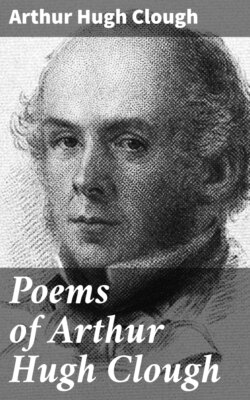Читать книгу Poems of Arthur Hugh Clough - Arthur Hugh Clough - Страница 36
На сайте Литреса книга снята с продажи.
Scene IV.
Adam and Eve.
ОглавлениеEve. O Adam, it was I was godless then;
But you were mournful, heavy, but composed.
At times would somewhat fiercely bite your lip
And pass your hand about your brow; but still
Held out, denied not God, acknowledged still
Those glories that were gone. No, I never
Felt all your worth to me before; I feel
You did not fall as I did.
Adam. Nay, my child,
About our falls I don’t profess to know.
I know I ne’er was innocent as thou;
I only know, as you will have it so,
Were your descent more lengthy than was mine,
It is not that your place is lower now,
But that first ’twas higher up than mine;
It is, that I being bestial, you divine,
We now alike are human beings both.
About our fall I won’t profess to know,
But know I do,
That I was never innocent as thou.
Moping again, my love; yes, I dare swear,
All the day long while I have been at work,
With some religious folly in your head.
Eve. No, Adam, I am cheerful quite to-day;
I vary much, indeed, from hour to hour,
But since my baby’s birth I am happier far;
And I have done some work as well as you.
Adam. What is it tho’? for I will take my oath
You’ve got some fancy stirring in your brain.
Eve. Nay, but it vexes me for evermore
To find in you no credence to my thought.
Adam. What is it then you wish me to subscribe to?
That we were in a garden put by God,
Allowed to eat of all the trees but one.
Somehow—I don’t know how—a serpent tempted us,
And eat we did, and so were doomed to die;
Whereas before we were meant to live for ever.
Meantime, turned out——
Eve. You do not think then, Adam,
We have been disobedient unto God?
Adam. My child, how should I know, and what do you mean?
Your question’s not so simple as it looks;
For if you mean that God said this or that—
As that ‘You shall not touch those apples there,’
And that we did—why, all that I can say
Is, that I can’t conceive the thing to be.
But if it were so, I should then believe
We had done right—at any rate, no harm.
Eve. O Adam, I can scarcely think I hear;
For if God said to us—God being God—
‘You shall not,’ is not His commandment His?
And are not we the creatures He hath made?
Adam. My child, God does not speak to human minds
In that unmeaning arbitrary way.
God were not God if so, and good not good.
Search in your heart, and if you tell me there
You find a genuine voice—no fancy, mind you—
Declaring to you this or that is evil,
Why, this or that I daresay evil is.
Believe me, I will listen to the word;
For not by observation of without
Cometh the kingdom of the voice of God:
It is within us—let us seek it there.
Eve. Yet I have voices, surely, in my heart.
Often you say I heed them over much.
Adam. God’s voice is of the heart: I do not say
All voices, therefore, of the heart are God’s;
And to discern the voice amidst the voices
Is that hard task, my love, that we are born to.
Eve. Ah me, in me I am sure the one, one voice
Goes somehow to the sense of what I say—
The sense of disobedience to God.
O Adam, some way, some time, we have done wrong,
And when I think of this, I still must think
Of Paradise, and of the stately tree
Which in the middle of the garden grew,
The golden fruit that hung upon its boughs,
Of which but once we ate, and I must feel
That whereas once in His continual sight
We lived, in daily communing with Him,
We now are banished, and behold not Him.
Our only present communing, alas!
Is penitential mourning, and the gaze
Of the abased and prostrate prayerful soul;
But you, yourself, my Adam, you at least
Acknowledge some time somehow we did wrong.
Adam. My child, I never even granted that.
Eve. Oh, but you let strange words at times fall from you.
They are to me like thunderbolts from heaven;
I listen terrified and sick at heart,
Then haste and pick them up and treasure them.
What was it that you said when Cain was born?
‘He’s born of us and therefore is not pure.’
O, you corrected well, my husband, then
My foolish, fond exuberance of delight.
Adam. My child, believe me, truly I was the fool;
But a first baby is a strange surprise.
I shall not say so when another comes;
And I beseech you treasure up no words.
You know me: I am loose of tongue and light.
I beg you, Eve, remember nought of this;
Put not at least, I pray you—nay, command—
Put not, when days come on, your own strange whim
And misconstruction of my idle words
Into the tender brains of our poor young ones.
